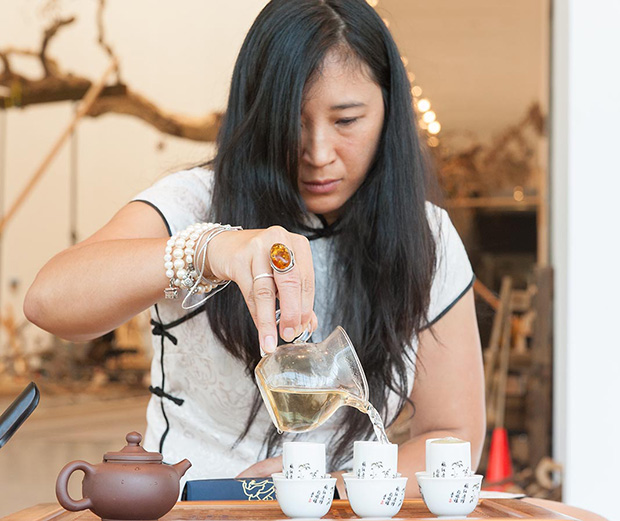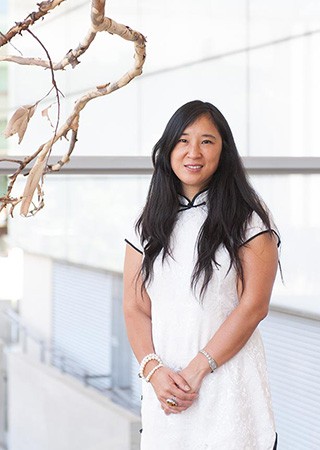MAY KING TSANG
DOB: November 13
Birthplace: Manchester, United Kingdom
Ethnicity: Chinese
Occupation: Tea Expert and Entrepreneur
Residence: Brisbane, Australia
Dina’s Thoughts
For several years now, May King Tsang has built up a one-woman brand focused on all things tea. Coming from a Chinese background, tea has always been an integral part of May King’s family and daily life. Despite a life-long passion and obsession with tea, she didn’t fully realize her ultimate dreams until a difficult divorce in her new home of Australia forced her to make dramatic changes, some of which resulted in finally having the chance to fulfill her potential.
In just a few short years, May King has become a renowned tea expert in Australia and through social media, she has steadily gained recognition throughout the world. She regularly speaks to rapt audiences on the health benefits of tea, encouraging people to appreciate this millennia old art and to fully understand how it should be integrated into a healthy diet. She is also a Tea Ceremony expert. Tsang has steadily gained supporters for her strong female leadership and outspokenness on women finding their individual paths.
My Interview with May King Tsang- World’s Leading Tea Expert
D: Share with us one of your earliest childhood memories.
M: I was about 6. My parents worked in the evenings so I was the designated baby sitter to my brother and sister and I would tell stories to help them sleep. A favourite story was about a blob of mud and I remember my brother and sister laughing about its adventures; to this day they still recall those fond memories.
D:Did you grow up with traditional Asian parents?
M: Yes and no. They were very traditional in that they wanted us to work in the family business as well as go to school (they owned a Chinese take-out restaurant). However unlike other Chinese families, my parents wanted us to get a good education and go to University so that we can get an “English job”. Other Chinese families expected their children to work and take over the family business.
Mum and dad were relatively open minded in that rather than have their children go through an arranged marriage, they wanted us to find our own life partners. They didn’t care if they were professionals or worked in a trade but as long we found our life partners after going to University and working in a good career they didn’t mind. Apparently when I was 16 years old, several Chinese families contacted my folks because they believed that I was “of marriageable age’. Fortunately my parents shooed them away respectfully.
If we were naughty, we were punished. It’s as simple as that. I am amazed at the children today who get away with talking back at their parents, are picky with their food and scream until they get their own way. My parents were very strict but I am truly grateful for that. The discipline they instilled helped shaped me to become the person I am today.
Traditional Chinese families work hard; place a huge importance on family but never really expressed emotions or talk about loving one another, from my experience. My parents were definitely like that. My Ex found it amusing how in my late twenties, I tried to express some emotion towards my parents but all I could muster was a friendly punch on my mum’s shoulder. That has changed now; as we have all grown a little older we are able to tell each other we love each other.
D:Was drinking tea a big part of growing up in your family?
M:Absolutely! It was something my brother, sister or I would make for our parents once they woke up for as long as I can remember. Tea would also be made immediately after dinner as tea aids digestion. We love all kinds of Chinese Tea and English breakfast too. And of course every Sunday we would go to Chinatown in Manchester and have Chinese Tea with Yum Cha.
D: When you were a teenager did you think about what you would do as a career?
M: My parents didn’t really mind what we did as long as it wasn’t the take-out business. I had several career aspirations. I wanted to be a teacher and then a lawyer although my mum put a stop to that as she had horrible visions of me putting the wrong person in prison. I also dreamed about being a professional singer but didn’t do enough to push that dream forward. I had a couple of opportunities presented to me but I waited on a couple of phone calls and really should have thought about making those phone calls myself. Hindsight is a wonderful thing isn’t it? I was also interested in computers at school and eventually I did work in IT after graduating with a BA Honors in Social Science.
D: What brought about your move to Australia?
M: My husband was given a chance to work here and he chose Brisbane rather than Sydney or Melbourne. After living in London for 10 years, he wanted to choose a city that had its own character and charm. I had just started my business in the UK but went to Australia to support my husband’s career and started MayKing Tea in Australia. He asked for a divorce unfortunately a couple of years later, but I am forever grateful for the relocation as Australia is my adopted home and hope that I’ll be able to stay here to keep my mission of bringing the teapot back and encouraging folks to take time with tea and live.
D:How did you decide that you wanted to create a path and business that focused on tea?
M:I was asked to go into a partnership by a friend of mine to run a coffee shop. After doing research in the large coffee chains, unsure of what coffee to order and uninspired by their tea menu, ironically I had my eureka moment to work in tea instead. I have been drinking tea since I was very young and when I decided to have a tea business, everything fell into place. I was fortunate enough to be able to travel to the United States several times in order to gain my qualification Certified Tea Specialist and of one of the top 50 speakers of tea as recommended by the Specialty Tea Institute.
I am a Tea Note Speaker, hired to talk about tea and a tea consultant helping others to start their tea business or to introduce a range of teas into their hospitality business. I’m game for anything that involves tea and have produced various tea workshops including Tea and Dessert pairings, 5 course tea gustation, tea cocktails, Afternoon Tea pairings with tea. I have even cooked with tea and ran many charity events involving tea.
D:Have you faced any specific challenges as a female entrepreneur that you think our male counterparts don’t deal with?
M: Yes. Women are often judged by their appearance rather than performance. It is a shame that women fear being judged by a man or a woman if they wear a top or skirt that is a little revealing, but unfortunately society still operates like that. That is why I am saddened when women run networking groups that have their gender in its name. By using words like chick or heels, even using the word women in a business, I feel that this disadvantages women and invites men not to take us seriously. I remember coming across a business that ran a prize for the best dressed women. It is bad enough that men do not take us seriously as business owners without resorting to giving a prize to a female entrepreneur because they dressed well that day. That said there is a gender bias and in fact I have heard men complain as they felt that if they were to create a business that was exclusive to men, they would be vilified, which is sad but probably true.
I have been patronized from time to time when spoken to especially by older men and it is infuriating but I suppose it can be difficult for some older men to keep up with society’s unwritten rules of how women used to be treated and how they are expected to be treated now.
Women that show leadership are regarded as bossy and yet if men demonstrate leadership, nothing is said of them. I have found myself in situations like that as a female entrepreneur. Gender bias unfortunately does still exist but I feel confident that we will see a greater shift towards gender neutrality, hopefully in my lifetime.
D: When you’re going through difficult times what’s your thought process to keep your positive attitude?
M: It is important to surround oneself with like-minded business owners and be part of a support circle where one can seek and offer support to and from others when one is experiencing difficult times. I created a Facebook group called Queensland Business where we have themes on each day designed to inspire, motivate and help each other.
As well as being founder of MayKing Tea and Queensland Business, I am also co-founder of The Likeability Company (TLC) and our TLC members also have a Facebook group. I read the posts in the Facebook group to inspire me and to keep positive. Reading the challenges that other people face reminds me that I am not alone and if I can help them, I will.
I am also fortunate to have support from friends and loved ones who are business owners. That said, there are times when talking to others might not work or watching a video or reading a quote doesn’t quite cut it, and that’s okay. Sometimes I allow myself to feel frustrated or stuck, especially when I have writer’s block. I walk away from the situation, go make a cup of tea and do something completely different. When the inspiration returns or I have that eureka moment, I go back and resume my work. If the moment doesn’t come, I try not to beat myself up about it as there is always tomorrow.
D: What are your current goals?
M: I have two missions.
To change the face of business by building relationships and community through Social Media. As was the traditional Chinese way of doing business, this is my first global mission: to help people to truly understand what it means to build relationships rather than thrust a business card (or a virtual business card when relationship building online) upon first meeting with them.
To have a better cup of tea in everyone’s cupboard, and to encourage folks to take time with tea with friends and family. I don’t believe in competition, merely collaboration so if they buy tea from me, that is great and if they buy from another tea merchant that’s okay too.
D: What advice would you give to young women wanting to start businesses?
M: Do not listen to the naysayers especially your friends and family. They love you very much and if they are not business owners, they will tell you their perception of running a business which tends to be very negative. It is because they love you that they want to protect you from failure because according to them, you will fail. Do not listen to them. Go for it.
Never discuss your business with your friends and family either. They will only be interested in the parts where you are ‘successful’ (to them, success generally means when you make money). They will not be interested in the build up to that success. Instead, surround yourself with business owners whom you can seek advice from. Go to networking meetings, listen to other business owners and write copious amounts of notes.
Make sure you research, research, and do more research for your business. Research online, cut out newspaper articles, read magazines and books. I read eight business books in the space of two months and I keep on reading and researching. Read autobiographies of business owners you admire as well books and blogs about running a business in your industry.




 Welcome to Food, Travel & Life with The Asian Fusion Girl. Learn more about the AF Girl and her various projects
Welcome to Food, Travel & Life with The Asian Fusion Girl. Learn more about the AF Girl and her various projects




